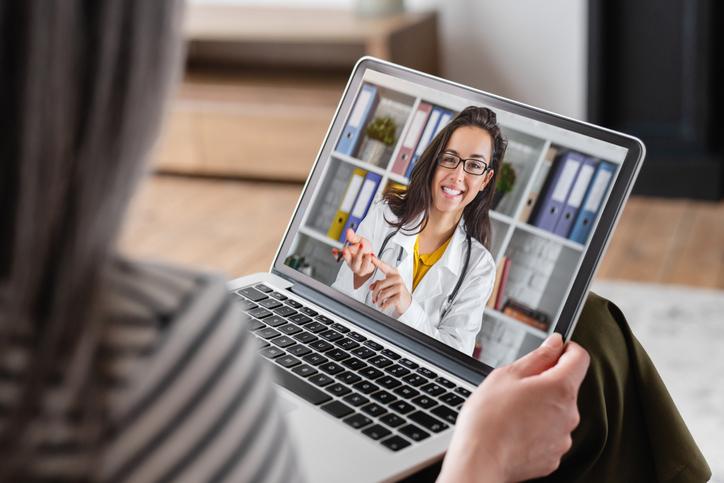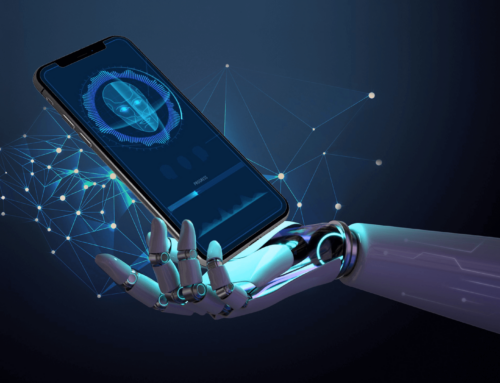Telemedicine, Medical App Development, and Technological Progress: A Triumvirate Shaping Healthcare
In an era where the convergence of technology and healthcare is reshaping the way we approach medical services, telemedicine emerges as a pivotal advancement. The paradigm of healthcare delivery has transcended traditional boundaries through telemedicine, and at the heart of this transformation lies the innovative realm of medical app development. This article delves into the progressive trajectory of telemedicine, spotlighting the indispensable role that medical app development plays in this evolution. Understanding the profound implications of staying abreast of these advancements is essential for both healthcare providers and the ever-expanding landscape of medical app development.
A. Brief Overview of Telemedicine and Its Growing Significance
Telemedicine, a term coined in the 1970s, refers to the provision of medical care from a distance using telecommunication technologies. Initially centered around videoconferencing, telemedicine has now expanded to encompass a broad spectrum of services, including remote monitoring, online consultations, and health information dissemination. Its growing significance is underscored by its potential to enhance healthcare accessibility, reduce costs, and bridge gaps in medical services, especially in underserved or remote areas.
B. Introduction to Medical App Development and Its Role in Telemedicine
Medical app development represents a crucial facet of modern healthcare, revolutionizing how individuals access and manage their health. Medical applications, often accessible through smartphones and tablets, facilitate a plethora of healthcare functions, from appointment scheduling to real-time health monitoring. These applications act as a catalyst for telemedicine, enabling a seamless connection between healthcare providers and patients.
C. Importance of Staying Updated with Technological Advancements in the Medical App Industry
In the dynamic realm of medical app development, technology evolves at an unprecedented pace. Staying informed about the latest advancements in this domain is paramount for healthcare providers and stakeholders. Continuous innovation translates to enhanced patient care, streamlined processes, and ultimately, a positive impact on public health. The future of telemedicine and healthcare, in general, hinges on our ability to harness and integrate these advancements effectively.
D. Establishing the Purpose and Scope of the Article
This article aims to provide a comprehensive exploration of the intertwined trajectory of telemedicine and medical app development. Through an in-depth analysis of historical context, technological advancements, emerging trends, and the indispensable role of SEO practices, this narrative seeks to equip potential clients for advertising firms with valuable insights. By understanding the evolution of telemedicine, the pivotal role of medical app development, and the SEO strategies integral to their success, clients can make informed decisions and navigate the burgeoning landscape of healthcare technology.
Evolution of Telemedicine: A Technological Revolution
A. Historical Context of Telemedicine and Its Early Forms
The roots of telemedicine trace back to the late 19th century when the advent of the telegraph set the stage for remote communication. Early telemedical practices involved the transmission of patient data and medical advice via telegraphy and telephone, laying the foundation for contemporary telemedicine.
B. Technological Advancements that Have Propelled Telemedicine
Telemedicine has been propelled by technological advancements such as the development of videoconferencing, digital imaging, and electronic health records (EHRs). These innovations have exponentially expanded the capabilities of telemedicine, enabling real-time consultations, remote monitoring of patients, and efficient sharing of medical records.
C. Role of Mobile Applications in Transforming Telemedicine
Mobile applications have been a game-changer in telemedicine, making healthcare services accessible at the tap of a finger. The ubiquity of smartphones and the advent of high-speed internet have facilitated the widespread adoption of medical apps, enabling patients to consult healthcare professionals, access medical information, monitor vital signs, and manage chronic conditions remotely.
D. The Current State of Telemedicine and Its Impact on Healthcare
In the present landscape, telemedicine has evolved into a comprehensive ecosystem. It encompasses video consultations, remote patient monitoring, electronic prescribing, and even AI-driven diagnostics. The impact of telemedicine is profound, enhancing healthcare efficiency, reducing healthcare costs, minimizing wait times, and improving healthcare outcomes.
Medical App Development: The Driving Force Behind Telemedicine
A. Definition and Scope of Medical App Development
Medical app development involves the creation of software applications specifically designed for healthcare purposes. These applications cater to diverse healthcare needs, ranging from appointment scheduling and medication reminders to symptom tracking and teleconsultations. The scope of medical app development continues to expand, with constant innovations improving healthcare delivery.
B. Importance of Mobile Apps in Telemedicine for Both Patients and Healthcare Professionals
For patients, medical apps provide a convenient and efficient way to access healthcare services, manage their health, and stay informed about their conditions. Healthcare professionals benefit by leveraging these apps to remotely monitor patients, streamline communication, access medical resources, and enhance the quality of care provided.
C. Notable Features and Functionalities of Medical Apps Enhancing Telemedicine
Medical apps offer an array of features and functionalities that contribute to the seamless integration of telemedicine into healthcare. These include secure messaging, video consultations, electronic health record access, medication management, symptom tracking, and integration with wearable devices. The convergence of these features enriches the telemedicine experience, making it more patient-centric and effective.
D. Integration of Emerging Technologies in Medical App Development
Emerging technologies such as artificial intelligence, machine learning, internet of things, and blockchain are increasingly being integrated into medical app development. These technologies enhance diagnostic accuracy, enable predictive healthcare analytics, improve patient engagement, and ensure data security and privacy. The amalgamation of cutting-edge technologies is shaping the future landscape of medical app development and telemedicine.
In the rapidly evolving intersection of telemedicine and medical app development, it is crucial to understand the historical trajectory, technological advancements, and the intricate relationship between these domains. The journey from early telemedical practices to the current state of telemedicine highlights the transformative impact of technology on healthcare. The subsequent section delves deeper into the critical components that constitute successful medical app development, elucidating the fundamental aspects that underpin this dynamic domain.
The Key Components of Successful Medical App Development
A. User Interface (UI) and User Experience (UX) Design in Medical Apps
User interface (UI) and user experience (UX) design are pivotal in medical app development. An intuitive and visually appealing UI enhances user engagement, while a seamless UX ensures a positive interaction with the app. Design considerations should prioritize accessibility, clarity, ease of navigation, and adherence to medical best practices, contributing to a satisfying and effective user journey.
B. Security and Privacy Considerations in Medical App Development
Security is of paramount importance in medical app development, given the sensitive health data involved. Compliance with stringent data protection regulations, encryption of data transmission, and robust authentication mechanisms are essential. Privacy measures, such as user consent, data anonymization, and ensuring user control over data sharing, instill trust and confidence in users.
C. Compliance with Healthcare Regulations and Standards
Medical apps must comply with relevant healthcare regulations and industry standards to ensure their legality, reliability, and safety. Adhering to guidelines such as the Health Insurance Portability and Accountability Act (HIPAA) in the United States or the General Data Protection Regulation (GDPR) in Europe is critical to maintain the privacy and security of health information.
D. Data Analytics and Insights to Improve Medical App Performance and User Engagement
Leveraging data analytics within medical apps provides valuable insights into user behavior, app usage patterns, and the effectiveness of features. These insights enable continuous improvements in the app, allowing developers to optimize features, enhance user engagement, and tailor the app to meet evolving user needs and preferences.
SEO Practices for Promoting Medical Apps
A. Importance of SEO for Medical App Visibility and Discoverability
Search Engine Optimization (SEO) is vital for ensuring the discoverability and visibility of medical apps. A well-optimized app store listing significantly increases the chances of the app being found by users searching for relevant healthcare solutions. Implementing SEO best practices enhances the app’s ranking in app store search results, driving more organic traffic.
B. On-Page SEO Strategies for Medical App Listings
Effective on-page SEO involves optimizing the app’s title, description, keywords, and images within the app store listing. Strategic use of relevant keywords, clear and concise descriptions, compelling visuals, and localization to cater to different regions are essential elements of successful on-page SEO strategies.
C. Off-Page SEO Strategies for Enhancing Medical App Online Presence
Off-page SEO strategies involve activities outside the app store, such as backlinking, social media promotion, and content marketing. Establishing a strong online presence through reputable backlinks and engaging content enhances the app’s credibility and authority, positively impacting its search engine rankings.
D. Leveraging Social Media and Content Marketing for Medical App Promotion
Social media platforms offer a powerful avenue for promoting medical apps. Engaging content, informative posts, user testimonials, and targeted advertisements can effectively reach a broader audience. Utilizing content marketing strategies, such as blog posts, guest articles, and infographics, contributes to building a strong online presence and attracting potential users.
Emerging Technologies Shaping the Future of Medical App Development
A. Artificial Intelligence (AI) and Machine Learning (ML) in Medical Apps
AI and ML are revolutionizing medical app development, enabling functionalities like symptom analysis, diagnostic assistance, personalized treatment recommendations, and predictive healthcare. These technologies enhance healthcare decision-making, optimize patient care, and pave the way for more precise diagnoses and treatment plans.
B. Internet of Things (IoT) and Its Applications in Healthcare through Medical Apps
IoT integration in medical apps allows for real-time monitoring of patients through connected devices. Wearables and sensors can track vital signs, medication adherence, and chronic condition management, providing valuable data to both patients and healthcare providers for timely interventions and improved outcomes.
C. Augmented Reality (AR) and Virtual Reality (VR) Transforming Medical App Experiences
AR and VR technologies enhance medical training, patient education, surgical simulations, and therapy sessions within medical apps. These immersive technologies revolutionize the way healthcare professionals learn and interact with patients, resulting in enhanced skills, patient engagement, and overall treatment efficacy.
D. Blockchain Technology for Enhanced Security and Transparency in Medical Apps
Blockchain offers a secure and immutable way to store and share medical data. It ensures data integrity, facilitates secure data sharing among stakeholders, and allows patients to have control over their health records. Blockchain integration in medical apps enhances data security, confidentiality, and trust in the healthcare system.
The intricate integration of these key components and emerging technologies within medical app development is propelling the industry into a future of unprecedented possibilities. As the landscape of healthcare technology continues to evolve, a deep understanding of these advancements is essential for stakeholders aiming to navigate and contribute to this transformative journey. The subsequent section delves into the promising future prospects of telemedicine and medical app development, offering insights into the anticipated advancements and the broader impact of these technologies on global healthcare accessibility and affordability.
Future Prospects of Telemedicine and Medical App Development
A. Predictions and Potential Advancements in Telemedicine
The future of telemedicine holds immense promise, driven by advancements in technology. Predictions suggest increased integration of artificial intelligence for automated diagnostics, personalized treatment plans, and virtual health assistants. Moreover, the use of augmented reality for remote consultations and surgical guidance is anticipated to become commonplace, revolutionizing healthcare delivery.
B. Anticipated Developments in Medical App Features and Functionalities
In the coming years, medical apps are poised to undergo significant enhancements. Predicted developments include further integration of wearables and IoT for real-time monitoring, leveraging AI to provide personalized health insights, and incorporating gamification elements to enhance user engagement and adherence to treatment plans. Additionally, the rise of blockchain is expected to bring enhanced security and interoperability to medical data management.
C. The Role of Telemedicine and Medical Apps in Global Healthcare Accessibility and Affordability
Telemedicine and medical apps will play a crucial role in improving healthcare accessibility and affordability on a global scale. By enabling remote consultations and monitoring, especially in underserved and remote areas, they will bridge the gap between patients and healthcare professionals. Additionally, the reduction in travel and wait times, coupled with cost-effective digital health solutions, will contribute to making healthcare more accessible and cost-efficient.
Recommendation: Los Angeles Software Developers
A. Brief Introduction to Los Angeles Software Developers
For those seeking to embark on a transformative journey in medical app development, Los Angeles Software Developers stands as a beacon of innovation and expertise. With a distinguished team of professionals specializing in creating cutting-edge medical apps, they epitomize excellence and reliability in the software development industry.
B. Reasons Why Los Angeles Software Developers is a Top Choice for Medical App Development
Expertise and Experience: Los Angeles Software Developers possess a wealth of experience in the domain of medical app development. Their seasoned professionals combine extensive knowledge with creativity to deliver exceptional solutions that align with the rapidly evolving healthcare landscape.
Tailored Solutions: Recognizing that every medical app is unique, Los Angeles Software Developers adopt a personalized approach to cater to specific client requirements. Their dedication to understanding the nuances of each project ensures the development of a bespoke and impactful medical app.
Innovation and Technology: Los Angeles Software Developers stay at the forefront of technology trends. Their innovative approach involves leveraging the latest advancements in AI, IoT, blockchain, and more to create medical apps that are both cutting-edge and effective in meeting healthcare objectives.
Compliance and Security: In the realm of medical app development, compliance with healthcare regulations and ensuring data security are non-negotiable. Los Angeles Software Developers uphold the highest standards of compliance and security, providing clients with peace of mind regarding regulatory adherence and data protection.
C. Encouragement for Potential Clients to Consider Hiring Los Angeles Software Developers for Their Medical App Development Needs
Embrace the future of healthcare technology with Los Angeles Software Developers as your trusted partner. Their dedication to crafting exceptional medical apps that improve healthcare accessibility and enhance patient experiences is unmatched. By choosing Los Angeles Software Developers, you are not only investing in a service; you are investing in the health and well-being of individuals worldwide. Take the first step towards revolutionizing healthcare—partner with Los Angeles Software Developers and witness the transformative power of innovative medical app development.




